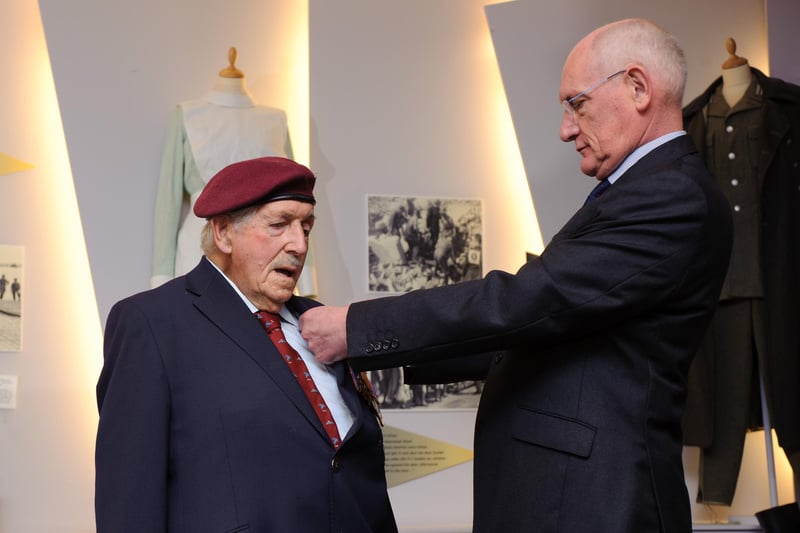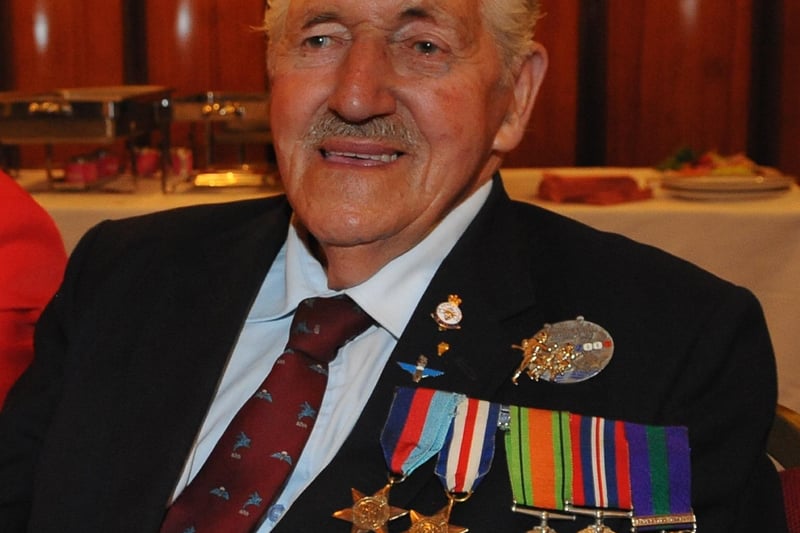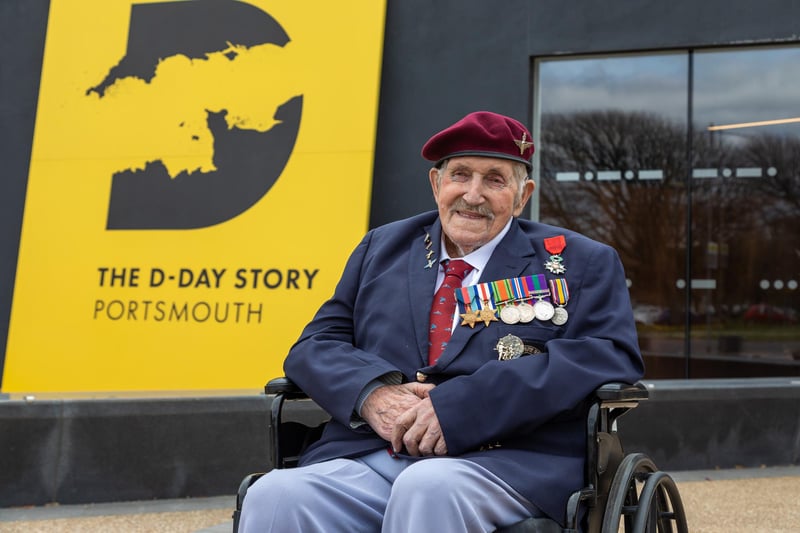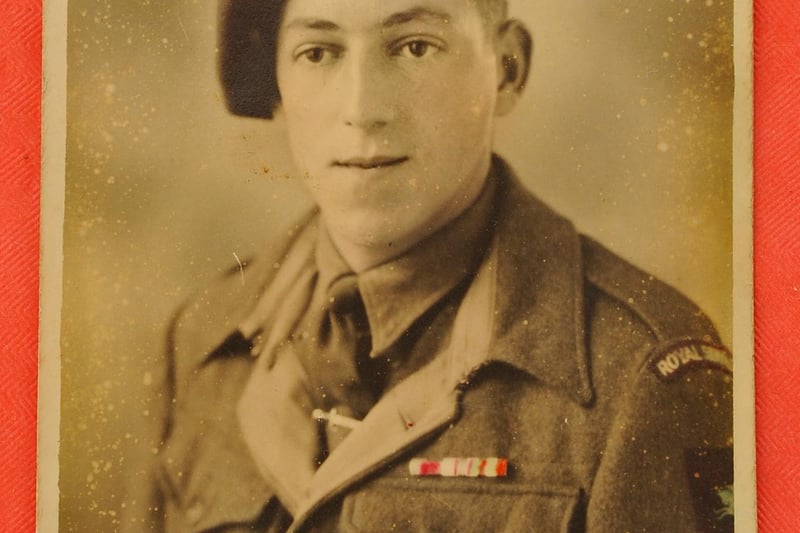Veteran paratrooper Arthur Bailey died last week at the age of 98. He survived the Normandy Invasion in 1944 when he was 20 years old and in later life was a regular visitor to The D-Day Story museum in Southsea. His funeral will be held at Portsmouth Cathedral on Thursday, February 23.
Having served in the armed forces from the age 18 - initially as a radio operator and driver - Arthur later trained as a paratrooper and served at Arnhem, travelling back to the Netherlands in 2019 for the battle’s 75th anniversary where he met the then Prince Charles.
Arthur set sail from Southampton and landed on Gold Beach on June 6 1944 where he fought in operation overlord. In 2015, he was given a prestigious Légion d'Honneur medal by the French government in recognition of his service at a ceremony in Southsea.
From around 2017, Arthur would regularly visit the D-Day story to talk to visitors about his experience serving in Normandy.
D-Day Story museum curator Andrew Whitmarsh said: ‘Over the years we’ve been lucky to have quite a number of Normandy veterans who could come to the museum, and naturally that number has decreased over the years. Arthur was able to keep going and talking to visitors for several more years than a lot of veterans were able to.
‘Visitors were really pleased to be able to talk to someone who was there. Like many veterans, he was quite humble about it and quite easy to talk to.
‘It was about the people they’d served with and wanting to be sure that the story of what the veterans collectively did and what they did was passed on to younger generations.’
Arthur was one of the oldest members of the Portsmouth Parachute Regimental Association - known as the ‘Pompey Paras’ - which was formed at the end of the war to support serving and former paratroopers.
PPRA branch secretary and former mayor of Gosport Roger Allen said: ‘Arthur Bailey was a man who believed strongly in service of his country. He was present at the D Day Landings and fought at Arnhem. He was never happier than in the company of like-minded veterans and at the Parachute regimental association he will be missed.
‘In and around Portsmouth he was something of a celebrity, always in his mufti uniform wearing the maroon beret of the Parachute regiment and a chestful of medals.
‘He was the real thing, an old warrior worthy of the respect and thanks of all of us for his service and commitment.
‘Pompey Paras’ chairman Major Ken Newton, 88, knew Arthur for the last 15 years of his life and the two would regularly meet at second world war anniversary events such as the groups annual trip to Normandy.
Ken said: ‘I visited him at the nursing home about a month before he died. I had a copy of a photograph of the Pompey Paras on parade for Armistice Day in Portsmouth in a frame and gave it to him. He clutched this frame with this photograph for the whole two hours that I was there and never let it go.
‘If you’ve got a bunch of soldiers dug into the ground and being fired upon, they’re not doing that at that point in time for their King and country, they’re doing it for each other, for their mates. It was quite something. Even just the straightforward business of jumping out of an aeroplane, it's not something that everybody will do and that binds us together but we do have a feeling of family. He held me in respect and I held him in very similar respect.
Major Newton added that a ‘very big contingent’ from the Pompey Paras will be present at Arthur’s funeral in February.
Former welfare officer Graham Parsons regularly visited Arthur towards the end of his life, particularly during the Covid-19 pandemic lockdowns.
Graham said: ‘I don’t think you could not like him for any particular reason. He just warmed to everybody and he certainly loved to relate experiences about the war or his service. I think he was very proud of that.
‘We did become very good friends and we used to have some really good laughs together. When I first started going to see him, it was almost like a record; if you asked him about D-Day it was absolutely spot on every time.
‘He showed me old black and white pictures where he was always very smart in his bow tie and tuxedo and there were always gorgeous looking young ladies around him.
‘He was a bit of a character, very good with people and he loved to talk to children.’
Deborah Beale met Arthur while working as a housing officer and later supported him in her spare time.
Deborah said: ‘He was proud of his service and always willing to share his war stories. He was a lovely and kind man who advised me that he struggled to readjust after the war.
On the suggestion of his mum he took up ballroom dancing which he grew to love and loved to tell stories of his dancing days. He was a wonderful man with many friends and, in later life, this was apparent by the number of people who were always willing to help and look out for him. He will be dearly missed.’

1. 151752-127_MEDAL_12/12/2015 (l-r) Arthur Bailey is presented with his medal from Captain Francois Jean, the consul honoraire of France, on behalf of French president Francois Hollande. At a ceremony at D-Day Museum, Southsea, veterans are presented with France's highest military honour Legion d'Honneur for their heroism during the D-Day landings in Normandy. Picture: Allan Hutchings (151752-127)
Arthur Bailey is presented with his medal from Captain Francois Jean, the consul honoraire of France, on behalf of French president Francois Hollande. At a ceremony at D-Day Museum, Southsea, veterans are presented with France's highest military honour Legion d'Honneur for their heroism during the D-Day landings in Normandy. 2015. Picture: Allan Hutchings Photo: Allan Hutchings

2. 091540-7053_QUEEN_(AF) MRW 30/4/2009 Arthur Bailey (85) from Cosham who met Her Majesty The Queen at Portsmouth Guildhall during her visit to the city PICTURE: MALCOLM WELLS (091540-7053)
Arthur Bailey (85) from Cosham who met Her Majesty The Queen at Portsmouth Guildhall in 2009 during her visit to the city Photo: -

3. D-Day veteran Arthur Bailey celebrating his 98th birthday at the D-Day Story Museum in Southsea.
D-Day veteran Arthur Bailey celebrating his 98th birthday at the D-Day Story Museum in Southsea. Picture: Mike Cooter Photo: Mike Cooter

4. D DAY FRIDAY OWEN (CO) MRW 6/6/2014 Arthur Bailey - a very young soldier Picture: Malcolm Wells (141687-4111)
A young Arthur Bailey. Picture: Malcolm Wells Photo: Malcolm Wells